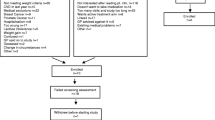Abstract
Background
Older people are less likely to be included in clinical trials. Little is known about factors influencing older people’s decisions about participating in clinical trials.
Objectives
To examine the views of older people about participating in clinical trials.
Methods
Postal questionnaire to 801 participants who had completed the MAVIS nutrition trial, aged 65yrs and older. Closed and open questions sought participants’ views about factors important to them when deciding to take part in a trial, features of the MAVIS trial they liked and disliked and changes they would suggest.
Results
540 (59% of MAVIS trial participants) returned the questionnaire. The most important reasons reported for taking part in the trial were helping the research team and medical knowledge, and helping other older people. Participants valued good communication with the trial staff and good organisation. Participants reported concerns about swallowing pills and taking a placebo. Participants reported that future participation in trials could be influenced by poor health status.
Limitations
This questionnaire surveyed older participants who had taken part in a randomised controlled trial. It did not elicit the views of people who had withdrawn or never decided to take part in the trial.
Conclusions
Older people report altruistic reasons for taking part in trials. Simple trial designs, which minimise demands on participants and maintain good communications should be preferred. Explaining the need for older people, despite poor health, to participate in trials may help the generalisability of clinical trials.
Similar content being viewed by others
References
Prescott RJ, Counsell CE, Gillespie WJ et al. Factors that limit the quality, number and progress of randomised controlled trials. Health Technol Assess 1999; 3(20): 1–143
Ross S, Grant A, Counsell C et al. Barriers to participation in randomised controlled trials: a systematic review. J Clin Epidemiol 1999; 52: 1143–1156
McDonald AM, Knight RC, Campbell MK et al. What influences recruitment to randomised controlled trials? A review of trials funded by two UK funding agencies. BMC Trials 2006; 7: 9
McMurdo ME, Witham MD, Gillespie ND. Including older people in clinical research. BMJ 2005; 331: 1036–1037
Ellis PM. Attitudes towards and participation in randomised clinical trials in oncology: a review of the literature. Ann Oncol 2000; 11: 939–945
Townsley CA, Selby R, Siu LL. Systematic review of barriers to the recruitment of older patients with cancer onto clinical trials. J Clin Oncol 2005; 23: 3112–3124
Donovan JL, Brindle L, Mills N. Capturing users’ experiences of participating in cancer trials. Eur J Cancer Care 2002; 11: 210–214
The Writing Group of the MAVIS Trial. A pragmatic randomised double-blind, placebo-controlled trial of the effect of vitamin and mineral supplements on morbidity from infections in men and women aged 65 years and over (MAVIS trial). BMJ 2005; 331: 324–327.
The EuroQol Group. EuroQol — a new facility for the measurement of health-related quality of life. Health Policy 1990; 16: 199–208
Ware JE, Kosinski M, Turner-Bowker DM et al. How to score version 2 of the SF12 Health Survey (with a supplement documenting version 1). Lincoln, RI: QualityMetric Incorporated, 2002
Wechsler D. Memory scale. London: Harcourt, Brace & Company, 1998.
Spreen O, Strauss E. A compendium of neuropsychological tests: administration, norms and commentary. Oxford: Oxford University Press, 1998
Bryman A. Social research methods. Oxford: Oxford University Press, 2001
Halpern SD, Karlawish JH, Casarett D, Berlin JA, Townsend RR, Asch DA. Hypertensive patients’ willingness to participate in placebo-controlled trials: implications for recruitment efficiency. Am Heart J 2003; 146: 985–992
van der Windt DA, Koes BW, van Aarst M et al. Practical aspects of conducting a pragmatic randomised trial in primary care: patient recruitment and outcome assessment. Br J Gen Pract 2000; 50: 371–374
Madsen SM, Mirza MR, Holm S et al. Attitudes towards clinical research amongst participants and nonparticipants. J Int Med 2002; 251: 156–168
Adams J, Silverman M, Musa D et al. Recruiting older adults for clinical trials. Control Clin Trials 1997; 18: 14–26
Schron EB, Wassertheil-Smoller S, Pressel S et al. Clinical trial participant satisfaction: survey of SHEP enrolees. J Am Geriatr Soc 1997; 45: 934–938
Hummer M, Holzmeister R, Kemmler G et al. Attitudes of patients with schizophrenia toward placebo-controlled clinical trials. J Clin Psychiatry 2003; 64: 277–281
Avenell A, Grant AM, McGee M et al. The effects of an open design on trial participant recruitment, compliance, and retention — a blinded, placebo-controlled design. Clin Trials 2004; 1: 490–498
Tardy B, Lafond P, Viallon A et al. Older people included in a venous thromboembolism clinical trial: a patients’ viewpoint. Age Ageing 2003; 32: 149–153
Buist DS, LaCroix AZ, Black DM. Inclusion of older women in randomised clinical trials: factors associated with taking study medication in the Fracture Intervention Trial. J Am Geriatr Soc 2000; 48: 1126–1131
Allsup S, Gosney MA. Difficulties of recruitment for a randomised controlled trial involving influenza vaccination in healthy older people. Gerontology 2002; 48: 170–173
van Teijlingen ER, Rennie A-M, Hundley V et al. The importance of conducting and reporting pilot studies: the example of the Scottish Births Survey. J Adv Nurs 2001; 34: 289–295
Bowling A. Research methods in health. Buckingham: Open University Press, 2002
Man-Son-Hing M, Hart RG, Berquist R et al. Differences in treatment preferences between persons who enrol and do not enrol in a clinical trial. Ann RCPSC 2001; 34: 292–296
Author information
Authors and Affiliations
Consortia
Corresponding author
Rights and permissions
About this article
Cite this article
Fearn, P., Avenell, A., Mccann, S. et al. Factors influencing the participation of older people in clinical trials — data analysis from the MAVIS trial. J Nutr Health Aging 14, 51–56 (2010). https://doi.org/10.1007/s12603-010-0009-x
Received:
Accepted:
Published:
Issue Date:
DOI: https://doi.org/10.1007/s12603-010-0009-x




